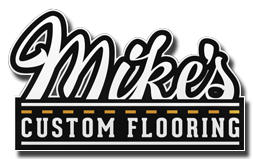Choosing the right installation method for your hardwood floors is important to ensuring their longevity and stability. Each installation method, such as glue down, nail down, and floating, has its own set of advantages and considerations. Understanding these methods can help you make an informed decision that suits your specific flooring needs and preferences. Mikes Custom Flooring will share what you need to know about each type of hardwood floor installation.
Glue Down Wood Floor Installation
Glue down installation involves adhering the wood planks directly to the subfloor using a strong adhesive. This method is commonly used for engineered hardwood flooring but can also be suitable for solid hardwood in some cases.
Advantages
• Stability: Glue down installation provides excellent stability and reduces the risk of the floor shifting or buckling over time.
• Sound Reduction: This method helps minimize noise, making it a great choice for multi-story buildings or areas where sound insulation is important.
• Compatibility: Suitable for both concrete and plywood subfloors, providing flexibility in various settings.
Considerations
• Subfloor Preparation: The subfloor must be clean, dry, and level before installation. Any imperfections can affect the adhesion and performance of the floor.
• Time and Skill: Glue down installation can be time-consuming and requires skill to ensure even application of the adhesive and proper alignment of the planks.
• Potential for Mess: Working with adhesives can be messy, and any excess glue must be cleaned up promptly to avoid damaging the floor’s finish.
Nail Down Wood Flooring Installation
Nail down installation involves securing the hardwood planks to the subfloor using nails or staples. This method is most commonly used for solid hardwood flooring but can also be used for some engineered wood products.
Advantages
• Durability: Nails provide a strong and lasting hold, making this method ideal for solid hardwood floors that can expand and contract with changes in humidity.
• Traditional Appeal: Nail down installation has been a standard method for many years and is often preferred for its tried-and-true effectiveness.
• Refinishing Capability: Solid hardwood floors installed using the nail down method can typically be sanded and refinished multiple times over their lifespan.
Considerations
• Subfloor Requirements: This method requires a wooden subfloor, such as plywood or OSB (oriented strand board). It’s not suitable for concrete subfloors without additional preparation.
• Skill Level: Proper installation requires skill and precision to ensure the nails are driven correctly and the planks are aligned properly.
• Expansion Gaps: Adequate expansion gaps must be left around the perimeter to accommodate the natural expansion and contraction of the wood.
Floating Wood Floor Installation
Floating installation involves fitting the hardwood planks together using a tongue-and-groove system or a click-lock mechanism, allowing the floor to “float” above the subfloor without being directly attached.
Advantages
• Versatility: Floating floors can be installed over a variety of subfloors, including concrete, plywood, and even existing flooring.
• Ease of Installation: This method is often simpler and faster than glue down or nail down installations, making it a popular choice for DIY enthusiasts.
• Flexibility: Floating floors can be easily removed and replaced, making them a good option for temporary installations or future renovations.
Considerations
• Sound and Feel: Floating floors can sometimes feel less solid underfoot and may produce more noise compared to glued or nailed floors.
• Subfloor Condition: While floating floors are more forgiving, the subfloor should still be clean, dry, and level to ensure a smooth installation.
• Moisture Concerns: While engineered hardwood can be used for floating floors, it’s important to ensure proper moisture barriers are in place, especially over concrete subfloors.
Hardwood Floor Installation, Repairs, Refinishing & More in Charles Town & Eastern Panhandle of Berkeley & Jefferson Counties in WV | Winchester & Frederick County | Round Hill & Loudoun County | Berryville & Clarke County | Herndon & Fairfax County VA
Each hardwood floor installation method offers unique benefits and potential drawbacks. Your choice will depend on factors such as the type of hardwood flooring, the condition and type of subfloor, your budget, and your personal preferences. If you need help installing hard wood floors, contact Mikes Custom Flooring and schedule our services today.





